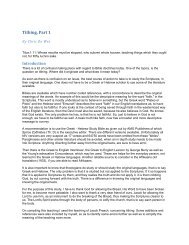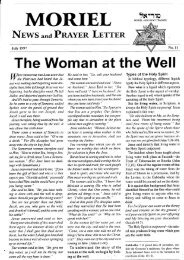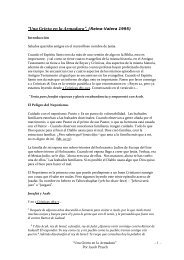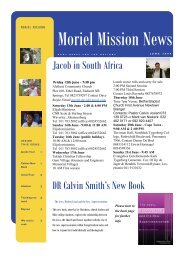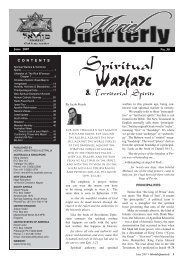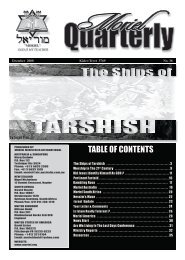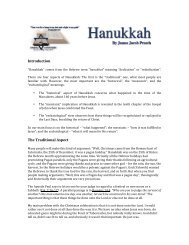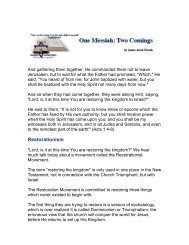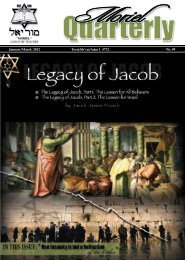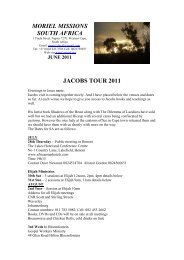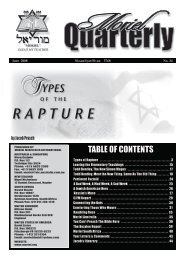April/June 20 No. 46 Nisan/Iyar//Sivan 577 - Moriel Ministries
April/June 20 No. 46 Nisan/Iyar//Sivan 577 - Moriel Ministries
April/June 20 No. 46 Nisan/Iyar//Sivan 577 - Moriel Ministries
Create successful ePaper yourself
Turn your PDF publications into a flip-book with our unique Google optimized e-Paper software.
egarded as unclean the blood of the covenant<br />
by which he was sanctified, and has<br />
insulted the Spirit of grace? (Heb. 10:27–29)<br />
Take note of the phrase, “has insulted the<br />
Spirit of grace.” It can lead to the point where<br />
they blaspheme the Holy Spirit. An unrepentant<br />
backslider can reach a point where he<br />
blasphemes the Holy Ghost. That is exactly<br />
what it is saying. We would have to do some<br />
monkey tricks to say this is talking about<br />
unsaved people. “Katapateo”–“trampled<br />
underfoot.” “Koinos hegeomenos”–literally<br />
meaning to be treating as common the blood<br />
of Jesus, and the word here is “enubrizo”–<br />
“insolence,” being insolent to God’s Spirit.<br />
Yes, there is an unpardonable sin. Hebrews<br />
6 and 10 directly connect to an unrepentant<br />
backslider who gets to the point<br />
that he begins to blaspheme the Holy Ghost.<br />
Hebrews 6 raises the possibility of an unrepentant<br />
backslider blaspheming the Holy<br />
Ghost. Hebrews 10 reiterates the same point<br />
and says that is what is going to happen.<br />
There is a point of no return. Go back to<br />
the illustration of the potter: he broke it, remade<br />
it, broke it, remade it, but eventually<br />
even the potter gave up. This is not in Scripture<br />
to get anyone discouraged, but it is there<br />
to make sure we understand what we have<br />
gotten ourselves into, and that we do not take<br />
lightly what God has called us to. It is not<br />
“departing” from the Lord–this is not “apostasia”;<br />
this is departing from His standard.<br />
The whole theme of Jude’s epistle is about<br />
backsliders in the Church. There are as many<br />
backsliders in here as there are out there.<br />
Scripture says that a backslider in heart is<br />
filled with his own ways (Pr. 14:14).<br />
Hebrews 28:10 states that it takes “two or<br />
three witnesses” in the Law of Moses to enact<br />
capital punishment. It will be worse for<br />
those who are Christians because Israel did<br />
not have what we have. “Athetesas” means<br />
“violated.” “Dokeite”–“do you think” in the<br />
Greek–is rhetorical. To ask a rhetorical question<br />
means to already know the answer. If<br />
this is what happened in the Law of Moses<br />
when they did not even have Jesus or the<br />
blood sacrifice that we have–if that is what<br />
happened when people did this under the Torah–what<br />
do we think is going to happen to<br />
us if we go this way? He is giving a warning,<br />
but he does not leave it there; he begins<br />
stressing the need for endurance.<br />
Assurance in Concert with Endurance<br />
For you have need of endurance, so that<br />
when you have done the will of God, you may<br />
receive what was promised. (Heb. 10:36)<br />
How do we endure? Keep the lifejacket<br />
on and keep swimming.<br />
“Oh, but we’re saved by faith through grace!”<br />
That is true, but what is faith? It continues<br />
in Hebrews 11:1: “faith “ is the “hupostasis”–“the<br />
assurance of things hoped for.”<br />
In the Bible, “hope” equals “future fact.”<br />
I guarantee you that if we keep following<br />
Jesus that we will go to Heaven. I guarantee<br />
that if we do not take the lifejacket off<br />
we will not drown. It is not that I “hope”<br />
we will not drown, I guarantee we will not<br />
drown if we keep the lifejacket on. I guarantee<br />
we will go to Heaven if we keep following<br />
Jesus. This is the way by which you<br />
can be eternally sure of your salvation. But<br />
if it is not this way we are playing with fire,<br />
and there are certainly people today who are<br />
playing with fire.<br />
There is no way we can say as Calvinists<br />
do that this applies to people who heard the<br />
Gospel and came to a certain point and then<br />
withdrew. It is simply not so. They have a<br />
“dorea.” There is no way we can say it only<br />
meant that Jewish believers could not possibly<br />
go back under the Law. It is talking<br />
about people who can fall away, who can<br />
depart from God’s standard. They have to<br />
play games with the text instead of letting it<br />
say what it means and mean what it says.<br />
Imputed Righteousness<br />
Calvinists will tell you that righteousness<br />
is imputed. So we have to understand what<br />
“imputation” means; it is an interesting term.<br />
What shall we say then? Are we to continue<br />
in sin so that grace may increase? May<br />
it never be! How shall we who died to sin<br />
still live in it? (Rom. 6:1–2)<br />
Paul understands that imputed righteousness<br />
can be misunderstood. There were actually<br />
people in the Greek churches who believed<br />
that only the new creation mattered,<br />
that it did not matter what the old creation<br />
did so they could go out and keep on sinning<br />
in the old creation. Paul understood that imputed<br />
righteousness could be misunderstood,<br />
that people could think it is okay to continue<br />
to sin and still be saved. Look at what he is<br />
saying: he is writing to believers. So therefore<br />
those who believe in an unconditional<br />
“once saved, always saved” will say, “If<br />
they go back and practice sin it means they<br />
were never saved to begin with; they were<br />
never truly born-again to begin with. They<br />
made an empty or false confession or they<br />
had some kind of experience, but they were<br />
never really saved.” That certainly does not<br />
mean Hebrews 6 and it certainly does not<br />
mean Hebrews 10.<br />
Look at the Prodigal Son (Lk. 15:11-32).<br />
The Prodigal Son has multiple interpretations.<br />
(The rabbis said a parable had up to seventy<br />
different interpretations, certainly meaning<br />
“multiple” anyway.) One of the interpretations<br />
of the Prodigal Son is that of a backslider.<br />
A backslider will wind up the way the<br />
Prodigal Son did, upon faith in humiliation,<br />
coming back to his father. When a backslider<br />
comes back, the Father will forgive him and<br />
take him back, but he has to come back. And<br />
what does the father say? “This brother of<br />
yours was dead” (Lk. 15:32). He was dead!<br />
How then was it credited? While he was<br />
circumcised, or uncircumcised? <strong>No</strong>t while<br />
circumcised, but while uncircumcised.<br />
(Rom. 4:10)<br />
Feature Article – Continued<br />
Getting back to this idea of imputation, in<br />
Romans 4 Paul uses the word “elogisthe.” We<br />
get the word “impute” from the Latin in the<br />
Vulgate, “imputate.” The Hebrew is “chashab,”<br />
meaning “think.” “Impute” means “to<br />
reckon.” It is not that it is really “given” to us,<br />
but it is “reckoned;” God takes it into account.<br />
When Jesus died on the cross for our<br />
sins, God took our sin and put it on Him,<br />
and took His righteousness and put it on<br />
us. Even though He was righteous, unrighteousness<br />
was imputed to Him on the cross.<br />
Even though we are unrighteous, His righteousness<br />
is imputed to us when we come<br />
to the cross. Yes, righteousness is imputed.<br />
Abraham believed God and it was reckoned<br />
to him as righteousness (Gal. 3:6; Ja. 2:23).<br />
But then what happens? Yes, the righteousness<br />
is imputed, but not the fruits. The fruit<br />
of the Spirit cannot be imputed, nor can the<br />
fruit of the Spirit be ascribed. We are called<br />
to prove we are His disciples.<br />
Overcomers<br />
‘He who overcomes, I will grant to him to sit<br />
down with Me on My throne, as I also overcame<br />
and sat down with My Father on His throne.<br />
He who has an ear, let him hear what the<br />
Spirit says to the churches.’” (Rev. 3:21–22)<br />
To go to Heaven one must be an “overcomer.”<br />
We cannot overcome on our own<br />
strength and we cannot overcome in our own<br />
righteousness; it has to be in the righteousness<br />
and strength of Jesus. He does it for us.<br />
We can never swim the Channel in a storm in<br />
our own strength; somebody has to give us a<br />
lifejacket. But once somebody gives us the<br />
strength we must put it into operation, just<br />
like the example of little Donnie’s airplane.<br />
Heaven is for overcomers. God will give us<br />
the grace, the will, and the means to do it,<br />
but He also gives us the free will to make a<br />
choice. When we get saved, our free will is<br />
given back to us.<br />
Blessed are those who wash their robes,<br />
so that they may have the right to the tree of<br />
life, and may enter by the gates into the city.<br />
Outside are the dogs and the sorcerers and<br />
the immoral persons and the murderers and<br />
the idolaters, and everyone who loves and<br />
practices lying. (Rev. 22:14–15)<br />
“Blessed are those who wash their robes.”<br />
Some people wash their robes, but the Bible<br />
talks about those who make them dirty<br />
again. We can always go back to the blood of<br />
the Lamb and wash our robes, but taking the<br />
robe off, in figure, is like the young man who<br />
ran away naked when Jesus was arrested<br />
(Mk. 14:51-52). When persecution came he<br />
ran away and lost the garments of salvation.<br />
Back to the seven churches in Revelation<br />
2, Jesus says, “He who overcomes will not be<br />
hurt by the second death” (Rev. 2:11). He was<br />
writing here to born-again Christians. He was<br />
telling Christians that if they overcame they<br />
would not be hurt by the second death. Obviously<br />
there is a theoretical possibility at the<br />
very least, that these people could fall away.<br />
<strong>June</strong> <strong>20</strong>11 • <strong>Moriel</strong> Quarterly 13




